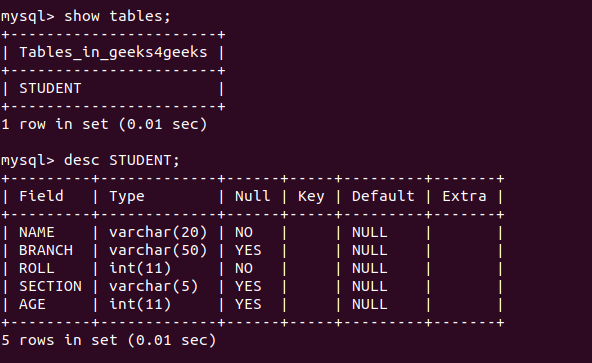Python database mysql tutorial
Python database mysql tutorial
I'd be happy to provide a Python database MySQL tutorial for you! Here's a comprehensive guide on how to use Python with MySQL:
Installing the necessary libraries
Before we begin, make sure you have the following libraries installed in your Python environment:
mysqlclient: This library is used to interact with MySQL databases in Python. You can install it using pip: pip install mysqlclient pandas (optional): If you want to work with data frames and perform data manipulation tasks, install pandas as well: pip install pandas
Connecting to a MySQL database
Now that we have the necessary libraries installed, let's connect to our MySQL database using Python:
import mysql.connector
Establish connection
cnx = mysql.connector.connect(
user='username',
password='password',
host='localhost',
port=3306,
database='mydatabase'
)
Create a cursor object
cursor = cnx.cursor()
Execute a SQL query
query = "SELECT * FROM mytable"
cursor.execute(query)
Fetch the results
results = cursor.fetchall()
print(results) # Print the query results
Close the cursor and connection
cursor.close()
cnx.close()
In this example, we're connecting to a MySQL database using the mysql.connector library. Replace 'username', 'password', 'localhost', and 'mydatabase' with your actual MySQL credentials.
Executing SQL queries
Now that we have connected to our database, let's execute some SQL queries:
# Execute a simple SELECT query
cursor.execute("SELECT * FROM mytable WHERE condition='something'")
results = cursor.fetchall()
print(results)
Execute an INSERT query
query = "INSERT INTO mytable (column1, column2) VALUES (%s, %s)"
data = ('value1', 'value2')
cursor.execute(query, data)
cnx.commit()
Execute a DELETE query
cursor.execute("DELETE FROM mytable WHERE condition='something'")
cnx.commit()
In this example, we're executing simple SELECT, INSERT, and DELETE queries. The %s placeholders are used to represent the values you want to pass to the SQL query.
Working with data frames
If you have a large dataset and want to perform data manipulation tasks like filtering, sorting, and grouping, consider using pandas:
import pandas as pd
Load the MySQL database into a Pandas dataframe
df = pd.read_sql_query("SELECT * FROM mytable", cnx)
Filter rows where column1 is greater than 5
filtered_df = df[df['column1'] > 5]
Sort the dataframe by column2 in descending order
sorted_df = filtered_df.sort_values('column2', ascending=False)
Group the dataframe by column3 and calculate mean of column4
grouped_df = df.groupby('column3')['column4'].mean()
In this example, we're loading a MySQL database into a Pandas dataframe using pd.read_sql_query. Then, we perform some data manipulation tasks like filtering, sorting, and grouping.
That's it! This tutorial should give you a solid foundation for working with Python and MySQL. Happy coding!
How to show database in Python MySQL?

Here's a step-by-step guide on how to connect to a MySQL database using Python:
Prerequisites
Python: You need to have Python installed on your system. mysql-connector-python: This is the library you'll use to interact with the MySQL database. You can install it via pip: pip install mysql-connector-python
Connecting to the Database
Here's a basic example of how to connect to a MySQL database using Python:
import mysql.connector
Define your connection details
username = 'your_username'
password = 'your_password'
host = 'localhost'
database = 'your_database'
Create a connection
cnx = mysql.connector.connect(
user=username,
password=password,
host=host,
database=database
)
Create a cursor object
cursor = cnx.cursor()
Execute a query
query = "SELECT * FROM your_table"
cursor.execute(query)
Fetch all the rows
rows = cursor.fetchall()
for row in rows:
print(row)
Showing Database
To show a MySQL database, you can use the show databases SQL command. You'll need to create a new query for this:
import mysql.connector
Define your connection details
username = 'your_username'
password = 'your_password'
host = 'localhost'
database = 'your_database'
Create a connection
cnx = mysql.connector.connect(
user=username,
password=password,
host=host,
database=database
)
Create a cursor object
cursor = cnx.cursor()
Execute a query
query = "SHOW DATABASES"
cursor.execute(query)
Fetch all the rows
rows = cursor.fetchall()
for row in rows:
print(row[0]) # prints each database name
Additional Tips
Make sure to replaceyour_username, your_password, localhost, and your_database with your actual MySQL credentials. Adjust the query as per your requirement, such as changing the table name or adding more conditions. Don't forget to close the cursor object after you're done using it:
cursor.close()
cnx.close()
This will ensure that resources are freed up and your program doesn't leave the database open unnecessarily.
Troubleshooting
If you encounter any issues, check the following:
Connection details: Double-check that your username, password, host, and database name are correct. Query syntax: Verify that your SQL query is well-formed and correctly formatted. MySQL version: Ensure that your MySQL installation is compatible with themysql-connector-python library.
By following these steps, you should be able to connect to a MySQL database and show its contents in Python!





























